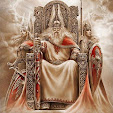The Elo rating system is a method for calculating the relative skill levels of players in zero-sum games such as chess. It is named after its creator Arpad Elo, a Hungarian-American physics professor. The Elo system was originally invented as an improved chess rating system over the previously used Harkness system, but is also used as a rating system for multiplayer competition in a number of video games, association football, American football, basketball, Major League Baseball, table tennis, Scrabble, board games such as Diplomacy and other games.
The difference in the ratings between two players serves as a predictor of the outcome of a match. Two players with equal ratings who play against each other are expected to score an equal number of wins. A player whose rating is 100 points greater than their opponent's is expected to score 64%; if the difference is 200 points, then the expected score for the stronger player is 76%.
A player's Eo rating is represented by a number with increases or decreases depending on the outcome of games between rated players. After every game, the winning player takes points from the losing one. The difference between the ratings of the winner and loser determines the total number of points gained or lost after a game. In a series of games between a high-rated player and a low-rated played, the high-rated player is expected to score more wins.
If the high-rated player wins, then only a few rating points will be taken from the low-rated player. However, if the lower-rated player scores an upset win, many rating points will be transferred. The lower-rated player will also gain a few points from the higher rated player in the event of a draw. This means that this rating system is self-correcting. Players whose ratings are too low should, in the long run, do better than the rating system predicts and thus gain rating points until the ratings reflect their true playing strengh.
Arpad Elo was a master-level chess player and an active participant in the US Chess Federation (USCF) from its founding in 1939. The USCF used a numerical ratings system, devised by Kenneth Harkness, to allow members to track their individual progress in terms other than tournament wins and losses. The Harkness system was reasonably fair, but in some circumstances gave rise to ratings which many observers considered inaccurate. On behalf of the USCF, Elo devised a new system with a more sound statistical basis.
Elo's system replaced earlier systems of competitive rewards with a system based on statistical estimation. Rating systems for many sports award points in accordance with subjective evaluations of the "greatness" of certain achievements. For example, winning an important golf tournament might be worth and arbitrarily chosen five times as a many points as winning a lesser tournament.









































